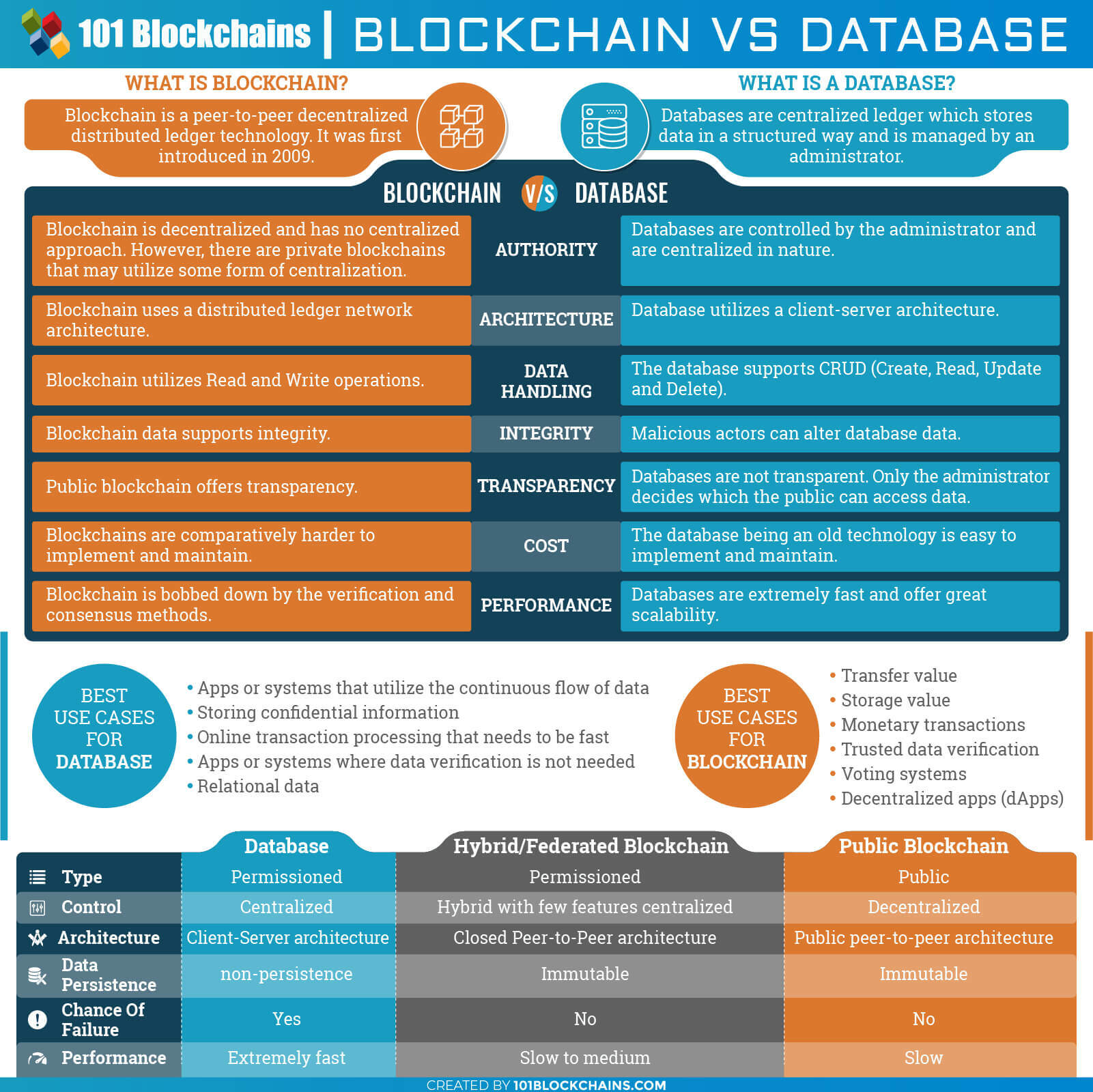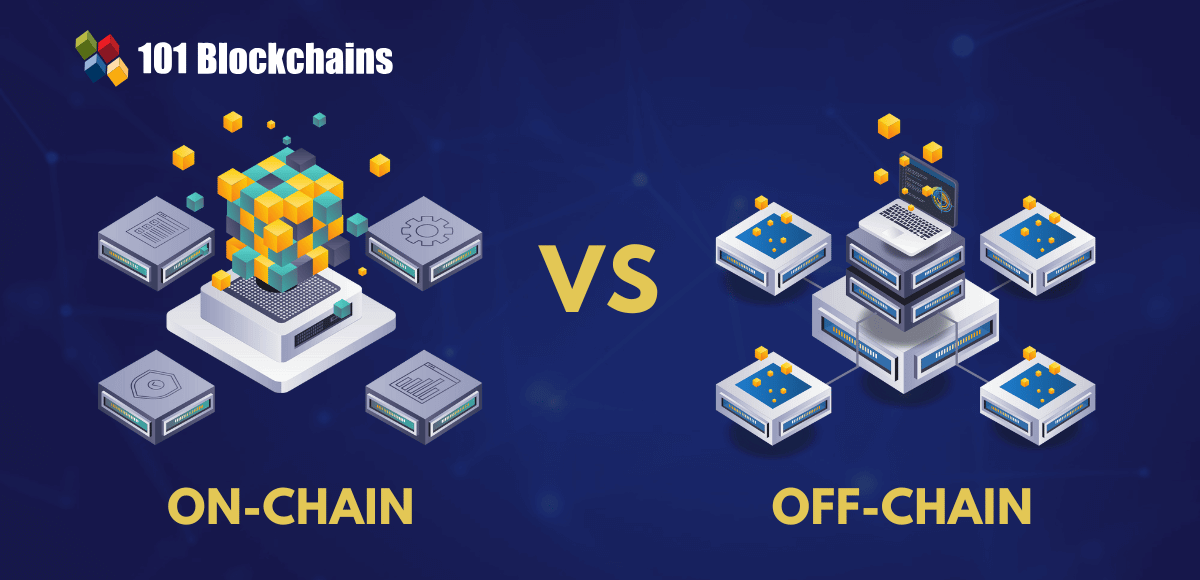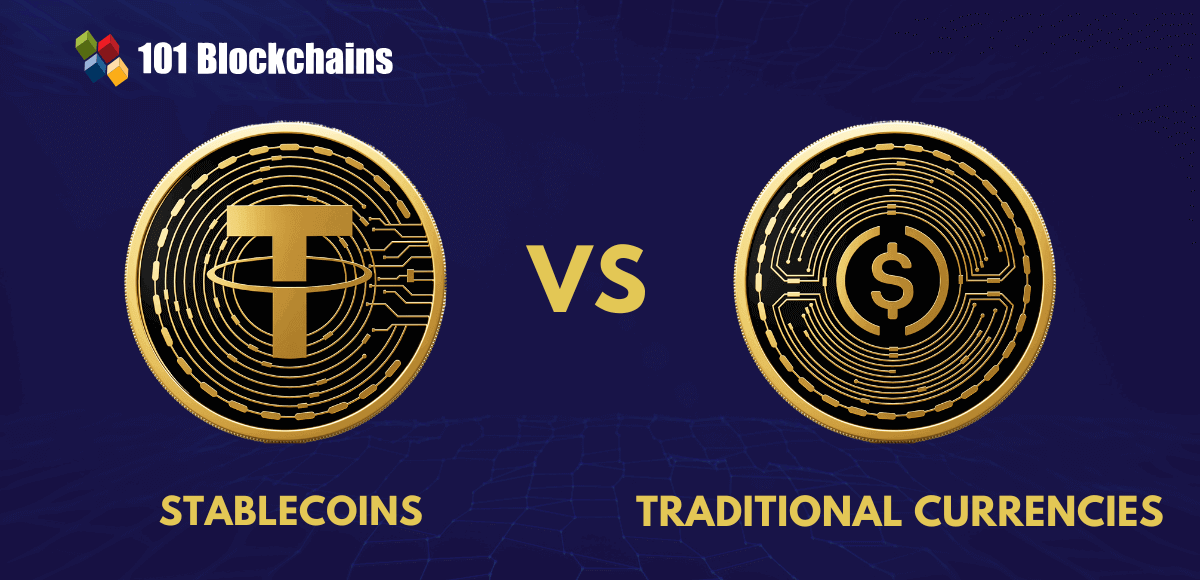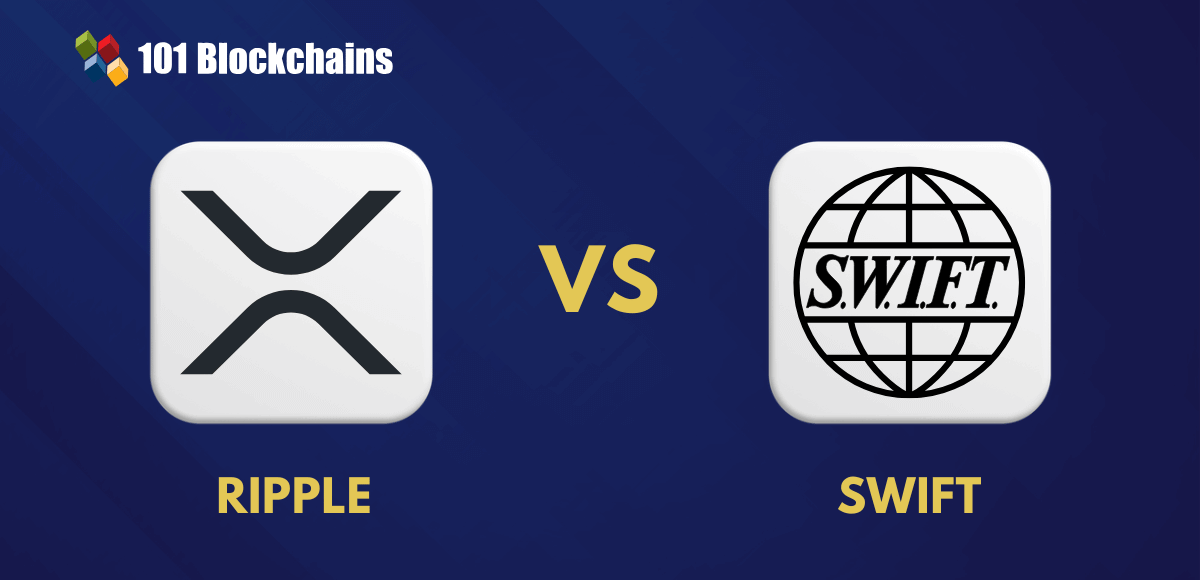Learn how blockchain truly works, master key definitions, and uncover what makes smart contracts so "smart." Dive into the fundamentals, gain valuable insights, and start your blockchain journey today!
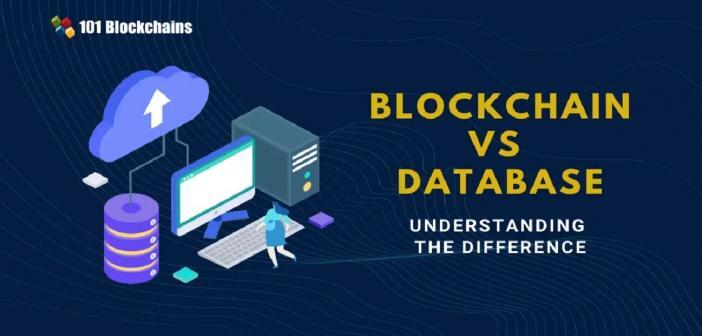
- Comparisons
Gwyneth Iredale
- on July 30, 2021
Blockchain vs Database: Understanding The Difference
Are you into blockchain technology and still wondering what the relation between blockchain and database is? Here, we will cover the comparison of blockchain vs database to help you understand where both these technologies stand.
For a newbie, both might sound similar. However, that’s not true even when many people out there consider blockchain “just another database.”
Also, you will find people searching for blockchain vs distributed database? Is there anything called “distributed database”? Or blockchain is simply a distributed database? We will answer all of these questions below.
Blockchain is more than just a database, and this article aims to a detailed comparison of blockchain vs. database.
Build your identity as a certified blockchain expert with 101 Blockchains’ Blockchain Certifications designed to provide enhanced career prospects.
Blockchain Vs Database: What Is Blockchain?
But, if you are new, don’t worry; we will cover blockchain in brief here before jumping into blockchain vs. database comparison. The basic definition of both database and blockchain will help us understand the blockchain vs. database comparison. Let’s get started.
Blockchain is a distributed ledger technology that enables a set of peers to work together to create a unified, decentralized network. The peers can communicate and share information or data with the help of the consensus algorithm. Also, there is no need for a centralized authority, which makes the whole network trustworthy when compared to other networks.
Let’s take a look at an example to understand how blockchain works. When one peer sends information to another, a transaction is generated. When this happens, the transactions need to validated using the consensus algorithm.
In this case, Proof of Work is used to validate the work. It ensures that no invalid transactions are passed into the blockchain. Blockchain is all about blocks. They are used to store transactions and other important information that is required to operate the blockchain successfully.
Timestamps are created to ensure that each transaction can be traced, backed, and verified by anyone. The whole system adds value and brings in new features such as transparency, immutability, and security.
What Is a Database?
With the idea of blockchain clear, it is now time for us to understand the database. The database, unlike blockchains, are a centralized ledger that is run by an administrator.
Databases also exhibit unique features, including the ability to read and write. Here, only the parties with proper access can do Write and Read actions. Databases also exhibit the ability to store multiple copies of the same data and their history. This is done with the help of a trusted, centralized authority who manages the server.
Centralization brings many benefits to the database. For example, it is easy to manage databases as the data is centralized. Accessing and storing data is not only easy but also fast. However, they also have drawbacks.
One of the biggest drawbacks is the chance of the data getting corrupted. To overcome the disadvantage, multiple backups are taken. But, that’s not always the case, as most of the entities always trust their owner and hence skip the backup data option. Another big drawback is how the data can be modified by anyone who is in control of the database itself. This can happen as the database is centralized in nature.
Start your Blockchain Developer Learning Path today and become a Blockchain Developer!
A Technical View
Now, let’s look at the database more technically.
A database utilizes data structure to store information. All the data that is stored in a database can be queried using a special querying language known as Structured Query Language (SQL). A database can work with almost every type of data and help support all modern enterprises. Also, it can be scaled to support millions of records.
The history of the database is also rich. It started with just hierarchical file systems. It had severe limitations, and hence it then later adapted to the relational model. The relational model is useful and gives the owner the ability to work with different databases at the same time. Database management systems are used to organize databases effectively.
At the core, data elements are stored in tables. The table consists of fields that can record a different type of data, known as attributes.
Without a proper business model in mind, it’s difficult to use blockchain as leverage. Check out our ultimate blockchain implementation strategy to learn more about developing blockchain.
Private Blockchain Vs Database: Are these Same?
There are many different types of blockchain. For example, we have a private blockchain that works in a closed ecosystem.
This may sound similar to what databases are about, but they are fundamentally different. Private blockchain inherits all the properties that a blockchain has to offer, but it works in a closed environment. Only people who are allowed by the administrator can participate in the blockchain. The only similarity between private blockchain and database is the centralized aspect.
Blockchain vs. Database
With each of the terms clear, it is now time for us to make the actual comparison. We will compare both the technology using important pointers, where we will discuss how they compare. Each pointer will also contain examples to ensure clarity and understanding. So, without any details, let’s get started.
Please include attribution to 101blockchains.com with this graphic. <a href='https://101blockchains.com/blockchain-infographics/'> <img src='https://101blockchains.com/wp-content/uploads/2019/04/Blockchain-vs-Database.jpg' alt='Blockchain vs Database='0' /> </a>
Blockchain vs Centralized Database: Authority and Control
If we compare blockchain and database, the first thing that you will notice is how authority works. Blockchain is designed to work in a decentralized manner, whereas the databases are always centralized. This unique feature of blockchain gives it the leverage it needs to become the next generation of technology.
Decentralization brings in a lot of implementation changes to the current systems and processes used by the different industries. It empowers networks to work independently and removes any need for centralized control.
Databases, on the other hand, function completely based on the centralized aspect. No traditional database is powered by decentralization. If you are specifically looking for a decentralized database, then blockchain falls directly into the category.
Now you know about the difference between blockchain vs centralized database.
Authority in Centralized Database
Let’s take a deeper look into how centralization works in databases. An administrator is allocated to manage the database. The administrator has all the control over the database, which means that he can manage, modify, and control the database the way he wants. Without an administrator, the database will not function at all.
He is at the top and can easily create, modify, change, and delete the records. Other than that, they can also perform other tasks, such as performance optimization. It is an important task as a larger database tends to get slow over time.
When it comes to other users associated with the database, an admin can delegate roles to other users. Other users can manage the database according to the role that they are assigned. For example, he can assign a user to create new users. Other key functions, such as backing up the database, maintenance, etc., can also be done.
However, it is not simple when we take into consideration the different types of blockchains out there. The basic blockchain introduced in bitcoin is completely decentralized, but it cannot be implemented among businesses with private data and processes at stake.
That’s why blockchain evolved, and we have a different type of blockchain. Hybrid/Federated blockchain is the most common type of blockchain out there that solves the problem of private organizations.
Hybrid blockchains are permissioned, which gives organizations the full ability to customize their setup according to the requirement.
This is one of the biggest differences when we do private blockchain vs database. We will cover more about hybrid/private blockchain later in the article.
Also Read: Top 10 Enterprise Blockchain Implementation Challenges
Blockchain Database vs Traditional Database: Architecture
Architecturally, both blockchain and database are different. So, what is the difference between the blockchain database structure and the traditional database structure? Let’s find out. You can a
A database is based on client/server architecture. It is a highly successful architecture that can work in both small-scale and large-scale environments. Here the client is the receivers, whereas the servers act as a centralized processing unit. The communication between client and servers are maintained through a secure connection.
Blockchain, on the other hand, uses a distributed ledger network architecture. It is a peer-to-peer enabled network where each peer can connect with another using secure cryptographic protocols. As there is no centralized node, nodes can collectively take part in the consensus algorithm.
One of the most popular consensus algorithms is Proof-of-Work, which requires miners to solve complex mathematical equations to validate transactions over the network.
The database doesn’t require a consensus algorithm and is completely dependent on the centralized approach.
The administrator controls every aspect of the database and is highly centralized. It is also permissioned like hybrid blockchain, but not when compared to the public blockchain. This hopefully answers your question related to permissioned blockchain vs database. The table below also covers permissioned blockchain vs database. Now you what’s the difference between blockchain database vs traditional database.
| Database | Hybrid/Federated Blockchain | Public Blockchain | |
|---|---|---|---|
| Type | Permissioned | Permissioned | Public |
| Control | Centralized | Hybrid with few features centralized | Decentralized |
| Architecture | Client-Server architecture | Closed Peer-to-Peer architectur | Public peer-to-peer architecture |
| Data persistence | non-persistence | Immutable | Immutable |
| Chance of failure | Yes | No | No |
| Performance | Extremely fast | Slow to medium | Slow |
Blockchain Vs Database: Immutability and Data Handling
When it comes to data storage and handling, both blockchain and database work differently. In a traditional database, data can be stored and retrieved with ease. To ensure proper operation of the application, CRUD is utilized at the primary level.
CRUD stands for Create, Read, Update, and Delete. This also means that data can be erased and replaced with new values if needed.
Blockchain, on the other hand, works differently when it comes to data storage. Blockchain supports immutability, which means that data once is written cannot be erased or replaced. Immutability means that no data tampering is possible within the network.
Traditional databases don’t exhibit immutability and hence are more prone to being manipulated by a rogue administrator or third-party hacks.
In short, blockchain only supports two operations, Read and Write.
- Read Operations: Used to read or retrieve data from the blockchain network
- Write Operations: Used to add information and data to the blockchain network
Database Vs Blockchain Technology: Transparency
Another key property that blockchain offers is how anyone with the right tool can verify the data once written into the public blockchain. Transparency ensures that the public can trust the network.
Databases, on the other hand, being centralized, doesn’t support any form of transparency. Users cannot verify the information if they want to. However, an administrator can make a set of data public, but still, the data verification cannot be done by an individual.
Blockchain’s integrity is made possible thanks to the immutability it has to offer. Data, once stored cannot be corrupted or changed in any possible way, which means that the data integrity is maintained at any cost.
Want to understand the critical data privacy issues for blockchain solutions? Enroll Now: Blockchain and Data Privacy Masterclass
Blockchain Technology vs Database: Cost and Talent Acquisition
When it comes to implementation cost, a traditional database is less costly when compared to the blockchain. Blockchain is a fairly new technology and hence is still evolving.
This also means that a business needs to do proper planning and execution to integrate blockchain into their process.
Also, any business that is already operating needs to adopt new technology. The change in approach is a serious business as blockchain requires end-to-end implementation and cannot be just integrated into an existing system as an add-on.
The traditional database is easy to set up and scale. They work with most of the existing processes and hence work out of the box on many systems. This makes it an excellent choice for businesses who want to quickly and cost-effectively want to set up their database systems.
However, if we look at a longer look at the cost associated with each technology, blockchain might provide a more cost-effective solution as peers mostly manage the network. Organizations don’t have to deal with the extra cost associated with handling the network, which can save a lot of costs.
The same cannot be said when it comes to talent acquisition. Blockchain is fairly a new technology, which also means that there is a limited amount of talent available to deal with the practical blockchain applications. The cost of the blockchain talent is also high, which can increase the cost associated with the implementation and maintenance of blockchain on the higher side.
Database related talent, on the other hand, is easy to get. They are also affordable, and even small business can afford the cost of hiring a database expert.
Read More: Blockchain Vs Relational Database: What’s the Difference?
Blockchain vs Database: Speed and Performance
The speed of execution is also a critical aspect that we need to compare both blockchain and database. Databases are known for faster execution time and can also handle millions of data at any given time.
Blockchain is considerably slower when compared to databases. However, it can be because blockchain is a relatively new technology and still needs a lot of time to evolve and match up to the standards of well-aged technologies such as databases.
When a transaction is carried out in the blockchain, it does all the things that a traditional database will do. However, it is slowed down because of carrying more operations, including the following.
Signature Verification:
Blockchain transactions, when carried out, are cryptographically signed using cryptographic algorithms. This step is needed to ensure that each transaction is valid and originated from a valid source. As it is a complex process, it takes time to carry out the process. Even though the whole blockchain application is fast, the signature verification can bottleneck. In comparison, a centralized database doesn’t have to go through the signature verification process, which makes them comparatively faster.
Consensus Mechanisms:
As blockchain is decentralized, it relies heavily on a consensus mechanism to validate transactions on to the blockchain. Also, the speed of consensus depends on the type of consensus method used. Some consensus method is faster than others, but overall, it adds more time before a transaction can be processed. Centralized databases don’t suffer from this kind of issue as they are centralized in nature. Each transaction is verified automatically by the database and can be executed way faster using a queue.
Redundancy:
Blockchain is a complete network where each node plays a crucial role. To ensure that each node can participate, each transaction information needs to be stored and verified by each node.
These three aspects slow down the blockchain. This means that databases are comparatively faster when it comes to performance.
Blockchain vs Database: Best Use Cases
Now that we have understood some crucial differences between blockchain and databases, it is now time we learn the best use cases for both of them.
Databases Use Cases
The best use case for databases is enterprise solutions or networks. The reason behind it is how the database operates and bring stability to the whole network.
Databases are undoubtedly user-friendly and are already supported by many popular management systems for developers and administrators. Even websites with millions of visitors rely on databases to serve content. Forbes, for example, uses a database in conjunction with high-end systems.
The scalability is what makes databases such a good choice for the enterprises out there. Also, systems such as stock exchanges that rely on fast operations must use databases for better data flow. However, blockchain also seems to do great in enterprise networks.
The blockchain is not ideal for storing a huge amount of numerical data that needs to be regularly used. Another benefit is how data is stored in a database. It doesn’t have to go through verification during the write or read process. What makes the database a great choice is how cost-effective it can be, especially if there is a need to do basic bookkeeping.
To sum it up, the best use cases for the database include the following.
- Apps or systems that utilize the continuous flow of data.
- Storing confidential information
- Online transaction processing that needs to be fast
- Apps or systems where data verification is not needed.
- Relational data
- Standalone apps
Blockchain Use Cases
Blockchain’s purpose is completely different. It is a peer-to-peer network that establishes two important things to its users, i.e., transparency and trust. The distributed ledger is what makes it unique. It can change how an industry works and enhance every single aspect of it. So, what are the best use cases for blockchain? Let’s explore.
Any system that requires proper verification can utilize blockchain. For example, B2B Business-to-Business transactions can benefit immensely.
This includes supply chain, inventory management, and distribution. The key here is transparency as it enables businesses to follow every single movement without introducing more complexity. However, blockchain doesn’t scale that much and can slow down systems when handling large scale data records.
Not sure which parts of a supply chain can benefit from enterprise blockchain applications? Enroll Now: Enterprise Blockchains and Supply Chain Management Course
Another excellent use case of blockchain is permissioned networks. Permissioned networks such as voting can benefit from a decentralized approach and bring trust and transparency to the whole voting system.
Blockchain is also ideal for automating tasks within a platform. Smart contracts are introduced in the Ethereum blockchain, which brings in the ability to utilize stored procedures. If a certain condition is met, the code is automatically executed.
Ethereum blockchain also uses Proof of Stake (PoS), which is more efficient and less power-hungry.
To sum it up, the best use cases for blockchain include the following:
- Transfer value
- Storage value
- Monetary transactions
- Trusted data verification
- Voting systems
- Decentralized apps (dApps)
Learn the fundamentals of Blockchain through Blockchain basics flashcards and lay the foundation of a bright blockchain career!
Concluding Thoughts: Which One Should You Choose?
The choice of picking up your next data storage technology is not a tough one. We discussed the crucial difference between them, and both traditional databases and blockchain are the clear winners.
The database is a winner when it comes to utility, speed, and accuracy. However, blockchain is also a winner when it comes to innovation, verification, and automation.
Blockchain introduces a performance penalty because of its verification method. This clearly means that you should avoid blockchain where fast execution time is an essential factor. Databases are a great choice where the critical business process needs to be supported or scaled at the same time. The read and write process is also not simple when it comes to the blockchain, which makes the database more desirable for general purpose application.
In short, choose blockchain if you are looking for trust, transparency, and verification. Database, on the other hand, is ideal for high-performance apps or services. It is also an excellent choice for apps that require scalability. If you want to understand blockchain more thoroughly, you should check out our blockchain courses now!


